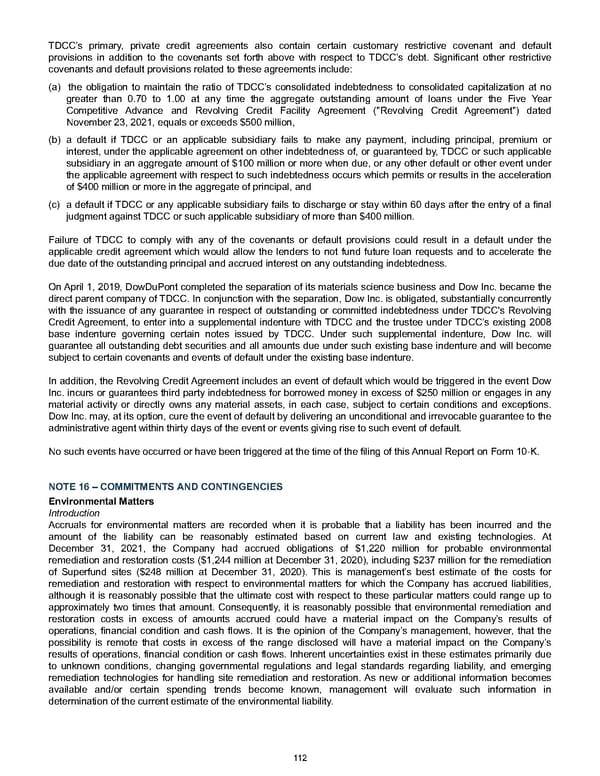TDCC’s primary, private credit agreements also contain certain customary restrictive covenant and default provisions in addition to the covenants set forth above with respect to TDCC’s debt. Significant other restrictive covenants and default provisions related to these agreements include: (a) the obligation to maintain the ratio of TDCC’s consolidated indebtedness to consolidated capitalization at no greater than 0.70 to 1.00 at any time the aggregate outstanding amount of loans under the Five Year Competitive Advance and Revolving Credit Facility Agreement ("Revolving Credit Agreement") dated November 23, 2021, equals or exceeds $500 million , (b) a default if TDCC or an applicable subsidiary fails to make any payment, including principal, premium or interest, under the applicable agreement on other indebtedness of, or guaranteed by, TDCC or such applicable subsidiary in an aggregate amount of $100 million or more when due, or any other default or other event under the applicable agreement with respect to such indebtedness occurs which permits or results in the acceleration of $400 million or more in the aggregate of principal, and (c) a default if TDCC or any applicable subsidiary fails to discharge or stay within 60 days after the entry of a final judgment against TDCC or such applicable subsidiary of more than $400 million . Failure of TDCC to comply with any of the covenants or default provisions could result in a default under the applicable credit agreement which would allow the lenders to not fund future loan requests and to accelerate the due date of the outstanding principal and accrued interest on any outstanding indebtedness. On April 1, 2019, DowDuPont completed the separation of its materials science business and Dow Inc. became the direct parent company of TDCC. In conjunction with the separation, Dow Inc. is obligated, substantially concurrently with the issuance of any guarantee in respect of outstanding or committed indebtedness under TDCC's Revolving Credit Agreement, to enter into a supplemental indenture with TDCC and the trustee under TDCC’s existing 2008 base indenture governing certain notes issued by TDCC. Under such supplemental indenture, Dow Inc. will guarantee all outstanding debt securities and all amounts due under such existing base indenture and will become subject to certain covenants and events of default under the existing base indenture. In addition, the Revolving Credit Agreement includes an event of default which would be triggered in the event Dow Inc. incurs or guarantees third party indebtedness for borrowed money in excess of $250 million or engages in any material activity or directly owns any material assets, in each case, subject to certain conditions and exceptions. Dow Inc. may, at its option, cure the event of default by delivering an unconditional and irrevocable guarantee to the administrative agent within thirty days of the event or events giving rise to such event of default. No such events have occurred or have been triggered at the time of the filing of this Annual Report on Form 10-K. NOTE 16 – COMMITMENTS AND CONTING ENCIES Environmental Matters Introduction Accruals for environmental matters are recorded when it is probable that a liability has been incurred and the amount of the liability can be reasonably estimated based on current law and existing technologies. At December 31, 2021 , the Company had accrued obligations of $1,220 million for probable environmental remediation and restoration costs ( $1,244 million at December 31, 2020 ), including $237 million for the remediation of Superfund sites ( $248 million at December 31, 2020 ). This is management’s best estimate of the costs for remediation and restoration with respect to environmental matters for which the Company has accrued liabilities, although it is reasonably possible that the ultimate cost with respect to these particular matters could range up to approximately two times that amount. Consequently, it is reasonably possible that environmental remediation and restoration costs in excess of amounts accrued could have a material impact on the Company’s results of operations, financial condition and cash flows. It is the opinion of the Company’s management, however, that the possibility is remote that costs in excess of the range disclosed will have a material impact on the Company’s results of operations, financial condition or cash flows. Inherent uncertainties exist in these estimates primarily due to unknown conditions, changing governmental regulations and legal standards regarding liability, and emerging remediation technologies for handling site remediation and restoration. As new or additional information becomes available and/or certain spending trends become known, management will evaluate such information in determination of the current estimate of the environmental liability. 112
 Annual Report Page 121 Page 123
Annual Report Page 121 Page 123